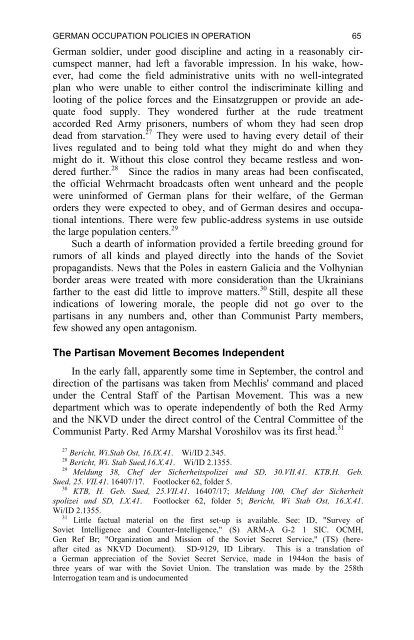the soviet partisan movement 1941-1944 by edgar m. howell
the soviet partisan movement 1941-1944 by edgar m. howell
the soviet partisan movement 1941-1944 by edgar m. howell
You also want an ePaper? Increase the reach of your titles
YUMPU automatically turns print PDFs into web optimized ePapers that Google loves.
GERMAN OCCUPATION POLICIES IN OPERATION 65<br />
German soldier, under good discipline and acting in a reasonably circumspect<br />
manner, had left a favorable impression. In his wake, however,<br />
had come <strong>the</strong> field administrative units with no well-integrated<br />
plan who were unable to ei<strong>the</strong>r control <strong>the</strong> indiscriminate killing and<br />
looting of <strong>the</strong> police forces and <strong>the</strong> Einsatzgruppen or provide an adequate<br />
food supply. They wondered fur<strong>the</strong>r at <strong>the</strong> rude treatment<br />
accorded Red Army prisoners, numbers of whom <strong>the</strong>y had seen drop<br />
dead from starvation. 27 They were used to having every detail of <strong>the</strong>ir<br />
lives regulated and to being told what <strong>the</strong>y might do and when <strong>the</strong>y<br />
might do it. Without this close control <strong>the</strong>y became restless and wondered<br />
fur<strong>the</strong>r. 28 Since <strong>the</strong> radios in many areas had been confiscated,<br />
<strong>the</strong> official Wehrmacht broadcasts often went unheard and <strong>the</strong> people<br />
were uninformed of German plans for <strong>the</strong>ir welfare, of <strong>the</strong> German<br />
orders <strong>the</strong>y were expected to obey, and of German desires and occupational<br />
intentions. There were few public-address systems in use outside<br />
<strong>the</strong> large population centers. 29<br />
Such a dearth of information provided a fertile breeding ground for<br />
rumors of all kinds and played directly into <strong>the</strong> hands of <strong>the</strong> Soviet<br />
propagandists. News that <strong>the</strong> Poles in eastern Galicia and <strong>the</strong> Volhynian<br />
border areas were treated with more consideration than <strong>the</strong> Ukrainians<br />
far<strong>the</strong>r to <strong>the</strong> east did little to improve matters. 30 Still, despite all <strong>the</strong>se<br />
indications of lowering morale, <strong>the</strong> people did not go over to <strong>the</strong><br />
<strong>partisan</strong>s in any numbers and, o<strong>the</strong>r than Communist Party members,<br />
few showed any open antagonism.<br />
The Partisan Movement Becomes Independent<br />
In <strong>the</strong> early fall, apparently some time in September, <strong>the</strong> control and<br />
direction of <strong>the</strong> <strong>partisan</strong>s was taken from Mechlis' command and placed<br />
under <strong>the</strong> Central Staff of <strong>the</strong> Partisan Movement. This was a new<br />
department which was to operate independently of both <strong>the</strong> Red Army<br />
and <strong>the</strong> NKVD under <strong>the</strong> direct control of <strong>the</strong> Central Committee of <strong>the</strong><br />
Communist Party. Red Army Marshal Voroshilov was its first head. 31<br />
27<br />
Bericht, Wi.Stab Ost, 16.IX.41. Wi/ID 2.345.<br />
28<br />
Bericht, Wi. Stab Sued,16.X.41. Wi/ID 2.1355.<br />
29<br />
Meldung 38, Chef der Sicherheitspolizei und SD, 30.VII.41. KTB,H. Geb.<br />
Sued, 25. VII.41. 16407/17. Footlocker 62, folder 5.<br />
30<br />
KTB, H. Geb. Sued, 25.VII.41. 16407/17; Meldung 100, Chef der Sicherheit<br />
spolizei und SD, I.X.41. Footlocker 62, folder 5; Bericht, Wi Stab Ost, 16.X.41.<br />
Wi/ID 2.1355.<br />
31<br />
Little factual material on <strong>the</strong> first set-up is available. See: ID, "Survey of<br />
Soviet Intelligence and Counter-Intelligence," (S) ARM-A G-2 1 SIC. OCMH,<br />
Gen Ref Br; "Organization and Mission of <strong>the</strong> Soviet Secret Service," (TS) (hereafter<br />
cited as NKVD Document). SD-9129, ID Library. This is a translation of<br />
a German appreciation of <strong>the</strong> Soviet Secret Service, made in <strong>1944</strong>on <strong>the</strong> basis of<br />
three years of war with <strong>the</strong> Soviet Union. The translation was made <strong>by</strong> <strong>the</strong> 258th<br />
Interrogation team and is undocumented
















